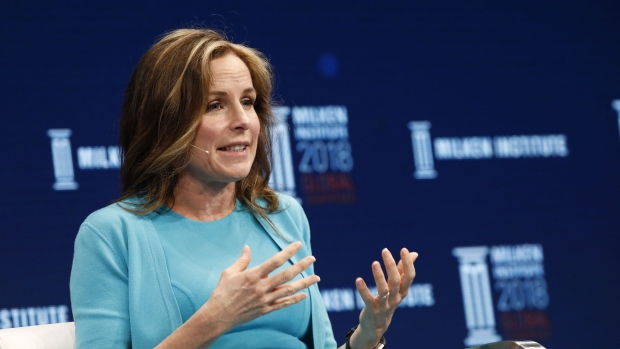Mar 25, 2021
Soros Chief Fitzpatrick Casts Off ‘Safe’ Label With 30% Gain
, Bloomberg News

(Bloomberg) -- Back when George Soros was running things, no one would have mistaken Soros Fund Management for safe, conservative or unambitious. Yet that’s the reputation his firm has acquired under Chief Investment Officer Dawn Fitzpatrick.
She’s determined to change that. Fitzpatrick plowed $4 billion into markets during the pandemic-induced swoon a year ago, pivoting amid collapsing prices and forced deleveraging to snap up assets such as residential mortgages on the cheap. Since then, Soros has returned almost 30% in the 12 months through February and now manages $27 billion.
“When there’s a dislocation, we’re prepared to not just double down but triple down when the facts and circumstances support that,” Fitzpatrick, 51, said in a Bloomberg “Front Row” interview. “I would put our returns and the quality of the returns we produced up against any asset manager or any hedge fund.”
Fitzpatrick, a former hedge fund manager herself, has spent four years rebuilding Soros into a more nimble operation -- one that can capitalize on its access to permanent capital and the ability to deploy it “in a big way” at any time. She dismissed or pushed out many of the internal portfolio managers she inherited and pulled cash from outsiders with underwhelming performance.
Now, with a renewed appetite for risk, Soros is allocating more to external managers who specialize in biotech, use leverage to boost returns or have a track record of beating the market -- even if their fees are high by industry standards. Its thematic bets include cryptocurrencies as well as battery technology and electric-vehicle developers such as Rivian Automotive Inc.
Fitzpatrick runs a “center book” of more than $1 billion, piggybacking on the best ideas from her investment team.
“This platform is just incredibly differentiated from any other pool of capital in the world,” she said.
There are disadvantages, too. Almost all of the money Fitzpatrick oversees is on behalf of the Open Society Foundations, the philanthropy George Soros uses to promote democracy, equality and human rights.
While she supports his mission and values, Soros himself is the frequent target of extremists and conspiracy theorists. Some chief executives have, citing his politics, excluded Soros Fund Management from participating in their initial public offerings, Fitzpatrick said. She declined to name them.
Fitzpatrick, who joined Soros from UBS Group AG in April 2017, is the ninth in a line of CIOs that has included Stan Druckenmiller, Keith Anderson and Scott Bessent. She acknowledges her changes slowed the firm’s momentum, poisoned some relationships and, when returns slipped to less than 1% the following year, left outsiders with the impression it had become timid.
“We did take one step back to take a lot of steps forward,” she said.
Soros Fund Management gained 23.2% in 2020 and 2.8% the first two months of this year, lifting its three-year return to an annualized 10.6%. Good performance is essential because the Open Society Foundations spends some $1.25 billion a year.
The Soros of old made huge wagers on currencies and famously “broke” the Bank of England with its trade against the pound in 1992. These days, macro bets on economic and political shifts account for just 5% of the firm’s portfolio.
Instead, Fitzpatrick is positioning Soros to be a “provider of liquidity,” seizing on market volatility to buy when others are forced to sell at the worst possible moment. That’s what happened last March when mortgage real estate investment trusts suddenly had to meet demands for cash from short-term lenders.
Unlike the multi-strategy hedge funds chasing those same opportunities, Soros isn’t subject to stop-loss orders and can hold positions for longer -- a competitive edge.
“Whenever you can play a game that other people can’t play, why wouldn’t you?” she said.
Soros is prioritizing social responsibility, both by backing clean technologies and also demanding that companies in which it invests disclose more on carbon emissions and employee diversity.
Today, Fitzpatrick favors equity long-short strategies that pick individual stocks rather than make directional bets. As of Dec. 31, the firm’s biggest publicly disclosed positions were Liberty Broadband Corp., Palantir Technologies Inc. and QuantumScape Corp., a battery developer.
She’s also looking at commercial real estate loans as the economy rebounds from Covid-19. Private markets “feel frothy” after a run-up in valuations, she said.
Four years in, Fitzpatrick has endured the initial skepticism and survived the aftermath of her internal shakeup. She enjoys a rare amount of latitude, meeting quarterly with a five-member investment committee. George Soros, now 90, doesn’t meddle in the portfolio, she said, though he occasionally takes an interest in trades “predicated on a geopolitical view.”
While the turnaround in performance is welcome, she’s proudest of building a team that can play to Soros’s advantages. The managers she ousted were too interested in “maximizing their individual outcomes,” Fitzpatrick said. Anyone who wants to work at Soros now has to satisfy a very different set of criteria.
“They have to buy into our culture and our philosophy about a focus on the aggregate results we’re producing for the foundation,” she said.
And if they don’t?
“I don’t care how good they are.”
(Adds ESG efforts in 17th paragraph. An earlier version of this story corrected Scott Bessent’s name.)
©2021 Bloomberg L.P.





